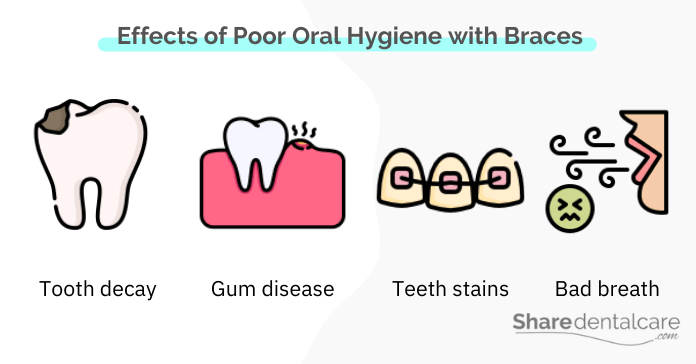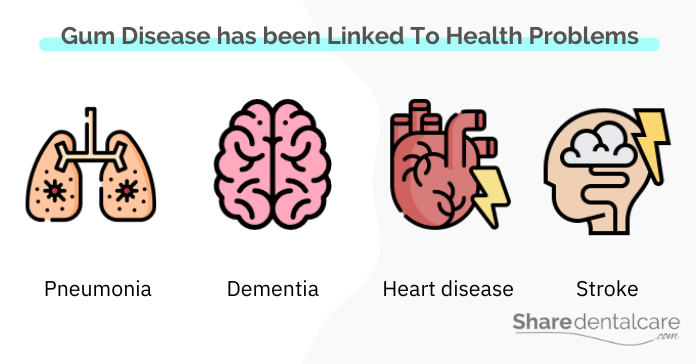Braces are devices used in orthodontics to correct misaligned or crooked teeth. They improve your bite, smile, and oral health. Poor oral hygiene with braces will prevent you from getting the most out of your orthodontic treatment. Also, poor oral hygiene while wearing braces can cause problems, such as tooth decay, inflammation of the gums, gum recession, and teeth discoloration. So, you must keep up on your oral hygiene care while you wear them. We will provide you with information on how poor oral hygiene with braces can affect your oral and general health.
The Importance of Oral Hygiene While Wearing Braces
Maintaining good oral hygiene while wearing braces is important because improper oral care can have negative effects on your oral and overall health. It also affects the way you look.
- Good oral hygiene while wearing braces can shorten the length of time it takes to straighten your teeth.
- It will help to prevent the buildup of dental plaque.
- It will prevent tooth decay and gum disease.
- Good oral health means good self-esteem.
- It will prevent complications after the removal of the braces, such as post-braces stains.
Effects of Poor Oral Hygiene with Braces on Your Oral Health
Braces increase the risk of tooth decay and gum disease because the brackets and wire can trap food particles and bacteria between them and the tooth. Poor oral hygiene practices include improper brushing, eating too many sugary foods, and smoking. The negative effects of poor oral hygiene habits with braces on your oral health include:

- Esthetic problems: poor oral hygiene with braces could lead to poor tooth and gum conditions which in turn can affect the overall appearance of your smile and self-esteem.
- Tooth decay: it occurs due to the accumulation of dental plaque between braces and teeth. Bacteria in plaque feed on carbohydrates and produce acids that attack the tooth enamel, causing tooth decay. Poor oral hygiene with braces increases your risk for tooth decay because braces cover a lot of teeth surfaces.
- Gum disease: poor oral hygiene with braces increases the risk of gingivitis and periodontitis. Plaque can accumulate under the bands and brackets, which irritate gums, causing them to become red, sore, and/or bleed easily. Dental plaque is also a risk factor for periodontitis, which results in tooth loss due to bone destruction.
- Gum recession: the most common cause of gum recession is poor oral hygiene. Bacteria accumulate around the brackets and wire causing irritation and inflammation of gums around the wire area, which causes them to recede away from the tooth.
- Bad taste and smell: the combination of food particles and bacteria around your teeth, brace, and on your tongue produces an unpleasant odor. Find out why you still have bad breath despite good oral hygiene.
- Teeth discoloration: teeth may discolor or stain due to poor oral hygiene while wearing braces because plaque buildup around brackets can cause brownish or yellow discoloration. Also, poor oral hygiene can cause white tongue.
- Loose tooth: poor oral hygiene while wearing braces can cause your teeth to loosen due to the poor condition of your gums.
Your orthodontist may stop or delay the treatment if you have multiple tooth decay or active gum disease because oral health comes first. You have to treat tooth decay or gum disease and maintain good oral hygiene first before starting orthodontic treatment.
The Link Between Poor Oral Hygiene & Overall Health
Poor oral hygiene is linked to serious health problems. Research has shown that harmful bacteria in the mouth can travel to other parts of the body through the bloodstream. Poor oral hygiene can cause gum disease (periodontitis), which is linked to other health problems such as:
- Respiratory infections (pneumonia).
- Dementia (Alzheimer’s disease).
- Heart disease & stroke.
- Diabetic complications because it makes blood sugar control difficult.
- In pregnancy, gum disease has also been associated with premature births and low birth weight.

Tips for Maintaining a Healthy Mouth While Wearing Braces
- Brush regularly. Brush your teeth daily and after every meal with fluoride toothpaste for two minutes. Be gentle while brushing braces.
- Keep a healthy diet. Avoid eating sticky or hard-to-chew foods while you have braces because it may loosen the wire. Your orthodontist will let you know which foods can be harmful and how they should be softened for easier chewing when wearing braces. It’s also important to eat foods that promote good health, such as whole grains, fruits, vegetables, lean cuts of meat, low-fat dairy products, eggs, and nuts.
- Limit the number of starchy foods (bread/bagels/pasta), sugars, and sugary drinks you consume to minimize the risk of developing tooth decay and cavities.
- Use fluoride rinse. Use fluoride rinse daily to help strengthen enamel. A fluoride rinse will strengthen the weak areas in your teeth first and then protect other parts of them while you wear braces.
- Regularly visit your orthodontist for check-ups. Follow your orthodontist’s instructions. Go to all of your scheduled appointments and follow all the advice given by the orthodontist on how to properly care for your braces during this time. Be sure to ask questions about anything you do not understand during your visit.
Not only poor oral hygiene with braces can affect your smile and overall health but it may also cause poor self-esteem. Take care of your teeth properly to have a healthy mouth, a good smile, and increased self-confidence.
Conclusion
Maintaining good oral hygiene is important for your oral and overall health, especially while wearing braces. Braces increase the risk of tooth decay, gum disease, and tooth discoloration because food particles get trapped between them and teeth. So, you have to brush your teeth regularly and after every meal.
If you don’t maintain good oral hygiene, your orthodontist may stop or delay the treatment until you improve oral hygiene because oral health comes first. Poor oral hygiene can have negative impacts on your smile, oral and overall health. So, maintain good oral hygiene and follow your orthodontist’s instructions for a healthy mouth and successful treatment.